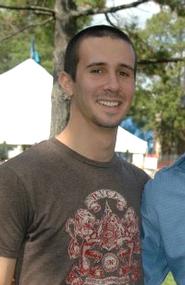
Many Americans underestimate the art of Japanese animation known as anime. Not only is anime a multi-billion-dollar industry in the United States alone, but it reincarnates important aspects of Japanese culture that may not otherwise be as accessible to American audiences. Alex Benkhart ’11 is investigating the characteristics and popularity of the Japanese heroine that echoes back to earlier tenets of Japanese culture.
Benkhart is working on the research through an Emerson grant and with guidance from Associate Professor of East Asian Languages and Literatures Kyoko Omori. Having watched anime for several years, Benkhart noticed the high number of strong female characters—many more, in fact, than in American movies. After taking a Japanese film class, Benkhart’s hypothesis was further confirmed, and he learned that many of the heroines in early Japanese film are based on those traditional stories, myths that predate recorded history. Although few records of these myths exist, they have been incorporated in later cultural documents that have remained intact for hundreds of years, most notably in Noh theatre, which was established in its own right around 500 years ago.
In many of these myths (and subsequent pieces of Noh theatre), Benkhart noticed, women have much closer affiliations to the spirit world than do the men. “A lot of female characters are possessed by demons or gods,” he said. This tendency in art has its base in traditional religious practices; in Shinto, women are the mediums to the gods and act as religious leaders, and the female deities have a significant presence in folklore.
Besides the dialogue within Japanese culture, Benkhart draws comparisons to American heroes in contemporary culture. “In America, Jesus and Moses are two of our most powerful cultural figures,” Benkhart said. He expects to find correlate figures based on Japanese myth and religion, both of which are prevalent in Noh. But the heroine’s journey is distinctly different from that of the male hero. To determine just what these differences are and their significance, Benkhart is reading Maureen Murdoch’s book The Heroine’s Journey, which is a reworking of Joseph Campbell’s seminal Hero’s Journey from a female perspective. “[The heroines are] more focused on reconciliation and communication than of conquering,” he said, which is one of the main differences between these gendered protagonist figures.
After he graduates next semester, Benkhart will apply for a Fulbright Grant with the intention of making a documentary in Japan about homosexual subcultures. While he is at Hamilton, however, Benkhart is a member of the Social Justice Initiative and the Asian Cultural Society. He also manages the tech crew and pursues his interest in digital video. He is an Asian studies and religious studies double major.
Benkhart graduated from Tabor Academy in Marion, Mass.
Benkhart is working on the research through an Emerson grant and with guidance from Associate Professor of East Asian Languages and Literatures Kyoko Omori. Having watched anime for several years, Benkhart noticed the high number of strong female characters—many more, in fact, than in American movies. After taking a Japanese film class, Benkhart’s hypothesis was further confirmed, and he learned that many of the heroines in early Japanese film are based on those traditional stories, myths that predate recorded history. Although few records of these myths exist, they have been incorporated in later cultural documents that have remained intact for hundreds of years, most notably in Noh theatre, which was established in its own right around 500 years ago.
In many of these myths (and subsequent pieces of Noh theatre), Benkhart noticed, women have much closer affiliations to the spirit world than do the men. “A lot of female characters are possessed by demons or gods,” he said. This tendency in art has its base in traditional religious practices; in Shinto, women are the mediums to the gods and act as religious leaders, and the female deities have a significant presence in folklore.
Besides the dialogue within Japanese culture, Benkhart draws comparisons to American heroes in contemporary culture. “In America, Jesus and Moses are two of our most powerful cultural figures,” Benkhart said. He expects to find correlate figures based on Japanese myth and religion, both of which are prevalent in Noh. But the heroine’s journey is distinctly different from that of the male hero. To determine just what these differences are and their significance, Benkhart is reading Maureen Murdoch’s book The Heroine’s Journey, which is a reworking of Joseph Campbell’s seminal Hero’s Journey from a female perspective. “[The heroines are] more focused on reconciliation and communication than of conquering,” he said, which is one of the main differences between these gendered protagonist figures.
After he graduates next semester, Benkhart will apply for a Fulbright Grant with the intention of making a documentary in Japan about homosexual subcultures. While he is at Hamilton, however, Benkhart is a member of the Social Justice Initiative and the Asian Cultural Society. He also manages the tech crew and pursues his interest in digital video. He is an Asian studies and religious studies double major.
Benkhart graduated from Tabor Academy in Marion, Mass.
Posted July 14, 2010
